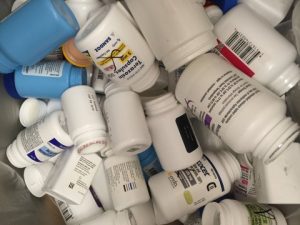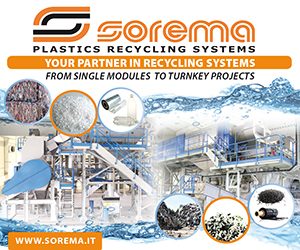 Pharmacies generate an abundant supply of clean, white HDPE that more often than not goes straight into the waste stream. The Association of Plastic Recyclers is looking to change that.
Pharmacies generate an abundant supply of clean, white HDPE that more often than not goes straight into the waste stream. The Association of Plastic Recyclers is looking to change that.
Stock bottles are the containers medications arrive in, before they are separated and prescribed to patients. The containers and paper are the most discarded materials in a typical pharmacy setting, and most locations already recycle paper.
“If they add stock bottles they can reach, essentially, zero waste,” said Liz Bedard, the Association of Plastic Recyclers’ (APR) rigid plastics recycling director.
APR last week added a pharmacy section to its grocery plastics program guide. The guide is part of the group’s program to encourage grocery stores to recycle their back-of-house HDPE and PP. Since the program started five years ago, stores across the country have begun recycling their plastics.
With this new effort, APR zeroed in on stock bottles specifically because pharmacies can begin recycling them relatively easily, especially those inside retail stores participating in APR’s grocery rigids program. Due in part to complications introduced by health privacy laws, the guide does not address the amber-colored pill vials patients receive. That could come at a future stage.
“My approach with new programs is to start with a low-hanging fruit and build from there,” Bedard said.
APR’s recommended process is relatively simple. APR suggests pharmacy staff members set up a collection bin with a liner bag specifically for empty stock bottles. Caps should be removed, APR said, because they’re generally polypropylene and would lower the value of the stream.
Since the majority of grocery plastics are polypropylene, the caps can easily integrate into that stream.
“We suggest separating them and still collecting them, just not in the same bin,” Bedard said.
Once the collection bags are full, they can be stored in the back of the store until they’re shipped to market. The bottles can be shipped in a single-stream with the store’s other recovered materials, separated and sent to a local recycling company, or backhauled to a distributor or recycling center, similar to the method advised through the grocery rigid plastics program.
APR estimates for a chain running 100 small pharmacy locations each serving between 500 and 1,000 prescriptions per week, the annual disposal savings would total $10,000.
“When they layer on the sale of the material, it makes good sense,” Bedard said.
More stories about HDPE
- Virgin PE producers maintain high run rates despite downturn
- ADS recycled plastic purchase share sinks to 3-year low
- APR updates design recognition, submissions



